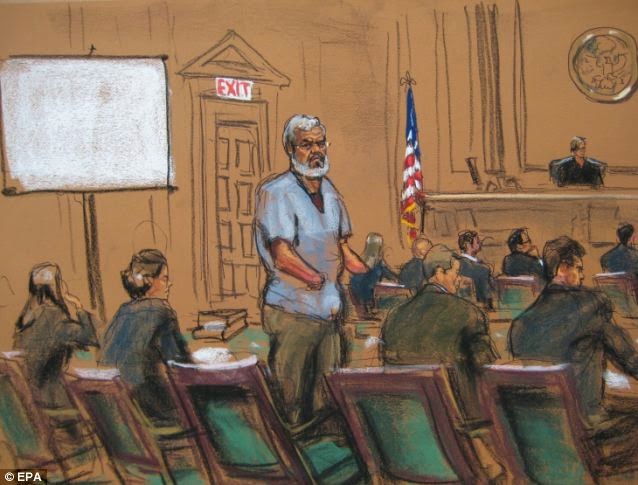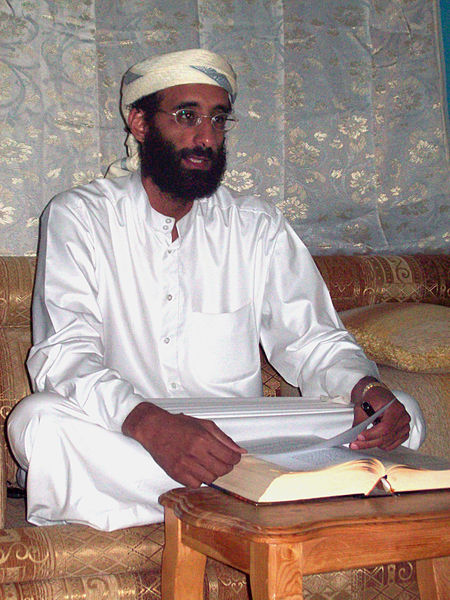 The show trials—past and current—of the legendary Finsbury Park imam, Egyptian-born British citizen Abu Hamza al-Masri, are a travesty of justice.
The show trials—past and current—of the legendary Finsbury Park imam, Egyptian-born British citizen Abu Hamza al-Masri, are a travesty of justice.
Hamza (b. 1958) was arrested by British police in 2004 when the US was trying to extradite him, and in 2006 a British court sentenced him to seven years’ imprisonment. After serving his time, he is now being paraded in a New York courtroom as a “terrorist facilitator with a global reach”, accused of plotting to set up a terror camp in rural Oregon (though he had never been in the US before the current trial), and providing a satellite phone to the eventual kidnapper of British and Australian tourists in Yemen in 1998 (was the British prosecutor napping in 2006?).
Hamza, disdainfully called the Hook by the tabloid press in allusion to the fictional pirate-villain Captain Hook, lost his hands and one eye in jihad-related activity in Afghanistan (possibly training to build bombs), when it was the West’s policy to support jihadists of all colors in such activities. He—inconveniently—did not abandon his militancy when Soviet troops left Afghanistan, and preached fiery sermons as the imam at Finsbury Park mosque in London from 1996 until he was ousted in 2003, after which he defiantly continued to hold services on the street outside the mosque.
The mosque had become a magnet for young radicals, including Algerians who had fled after Algeria’s elected Islamic government had been overthrown in the 1992 coup supported by the West. The end of the Soviet occupation of Afghanistan in 1989 was inspiring Muslims around the world to work together to throw off their neocolonial masters, and the western-backed Algerian coup was part of the new policy of subduing Islam now that the ‘communist menace’ was defeated.
Hamza’s eloquence and popularity also attracted Algerians from the Armed Islamic Groups (GIA), who claimed to be fighting for an Islamic Algeria, but were infiltrated by the Algerian secret police, intent on discrediting the Islamists through the indiscriminate murder of civilians. Though Hamza himself eventually realized the GIA was part of a campaign to blacken the Islamists, he nonetheless remained an enthusiastic supporter of Bin Laden’s efforts to resist imperialism by promoting violent jihad around the world. He did not hide his activities, and in the post-9/11 world, Hamza became an easy target in the ‘war on terror’.
What were his crimes? They amounted to lauding Osama Bin Laden and the 9/11 attacks, encouraging “selfless” men of “good character” to go to training camps in Afghanistan, inspiring the men later convicted of the failed 21/7 London bombings in 2005 (though there is no proof he even personally spoke to them), and having a “terrorist handbook” in his home.
Hamza's travails recall the sad fate of radical Muslim cleric Anwar al-Awlaki (b. 1971), a US citizen of Somali heritage. He and Pakistani-American Samir Khan were killed in a US drone attack in the northern Yemeni province of Mareb, home of the Awlaki clan, in 2011.
Though in the FBI’s sites from 1999, the eloquent and charismatic Awlaki became a media star after 9/11, interviewed by National Geographic and
 the New York Times as a moderate American Muslim, invited to a luncheon in the US Secretary of the Army’s Office of General Counsel. In 2002, he became the first imam to conduct a prayer service at the US Capitol for the Congressional Muslim Staffer Association and officials of the Council on American-Islamic Relations.
the New York Times as a moderate American Muslim, invited to a luncheon in the US Secretary of the Army’s Office of General Counsel. In 2002, he became the first imam to conduct a prayer service at the US Capitol for the Congressional Muslim Staffer Association and officials of the Council on American-Islamic Relations.Awlaki condemned the 9/11 attacks, stating, “There is no way that the people who did this could be Muslim, and if they claim to be Muslim, then they have perverted their religion.” On IslamOnline.net six days after the 9/11 attacks, he suggested that Israeli intelligence agents might have been responsible, and that the FBI “went into the roster of the airplanes, and whoever has a Muslim or Arab name became the hijacker by default”.
In the post-9/11 hysteria, such musings enraged US officials, and harassment by the FBI drove him to go to England in 2002, where he continued his preaching. He moved to Yemen in 2004, was arrested in 2006 on kidnapping and terrorism charges, imprisoned, but released in December 2007.
His sermons about Islamic ethics and the lives of the prophets became best-selling CDs and there were 1,910 Youtube videos of his lectures, though they have all been removed and his CDs are no longer for sale. In reference to the website of Inspire magazine, which Awlaki purportedly edited, in May 2013, US Attorney Barry Grissom warned, "Do not go to this website. You will be on our list."
What were Awlaki's crimes? The hardest evidence against him seems to be that Nidal Hasan, accused of killing 13 people at Fort Hood in 2009, was in touch with him, and Faisal Shahzad, who was behind the New York Times Square car bomb attempt in May 2010, cited him as an inspiration. True, he later openly advocated jihad against the US, but only after his prison (read: torture) experience.
The real reason he and Khan were targeted was because they were charismatic communicators of Islam to western dissidents. As desperate American and European youth become radicalized by the conflicts of the post-2001 period and the endless economic crisis, they will increasingly look to the likes of Awlaki who provide a simple, if misguided, solution for young people with nothing to lose.
Ditto Hamza and his followers. Hamza’s courage and charisma, a David facing Goliath, without hands to hold even a slingshot, must be snuffed out.
As the latest trial opened, his US lawyer, Joshua Dratel, noted that western governments, including the US, and his client were once on the same side, fighting in defence of Muslims in Afghanistan and in Bosnia against the Serbians. Dratel, who is Jewish, would not be defending Hamza if he was promoting anti-Jewish hatred, which he was accused of during his UK trial. While Hamza’s views were extreme, Dratel said, it was not illegal to hold them. At one point, he likened Hamza to Nelson Mandela, who was “once considered a terrorist. Now he’s an icon.”
But Dratel did not draw the logical conclusion: that it was the West that suddenly decided that its erstwhile allies were now ‘terrorists’, that the original alliance of empire with Islamists was an unholy pact, that Hamza is within his rights to resist the US and Israel. That they are the main promoters of terrorism around the world, training and arming armies and mercenaries to promote empire and undermine Islam, and that it is hypocrisy of the highest order to victimize a Muslim fighter who was once an ally of convenience, but who is now inconvenient.
Referring to Hamza, the Sunday Times at least admits to the “dimwitted and wildly ill-considered attempt over the past ... to exploit radical Islam.”
But then this travesty of justice also recalls the assassination and disposal of Osama Bin Laden at sea in May 2011. Such disregard for legal norms is hard to beat, but at least he was not an American or British citizen, and had actually committed a crime.





